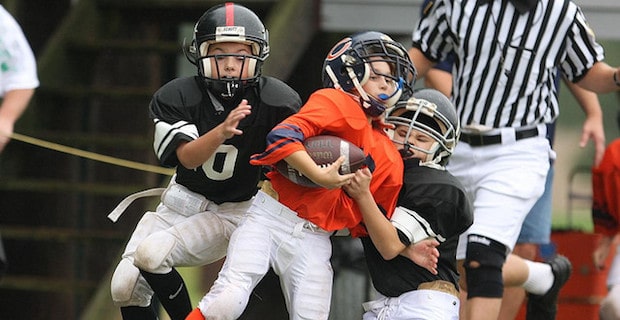
Sports provide an excellent platform to teach our youth about important, intangible life skills like teamwork, hard work, dedication, understanding roles and overcoming adversity. All these life skills can be undone by injury to the brain due to a concussion that is not managed properly.
Although concussions have caught the national media spotlight lately, most people — including parents, athletes, coaches, even medical personnel — have little respect for the consequences of concussion injury, or know what to do when a hit to the head occurs. Whether it’s during a contact sport or rough-housing around the home, concussions can have dire short- and long-term consequences if they are not treated carefully.
Read more about healthy sports drinks
In 25 years of studying the brain and behavior, treating hundreds of concussed patients, I’ve established a healthy respect for these traumatic events and hope to shed light on what every mom, dad, coach and league official need to know and do when they suspect a concussion has been suffered.
First, here’s a little brain briefing:
1. The brain is involved in everything. Hand-eye coordination, memory, language processing, reasoning, decision-making, and emotional control are just the tip of the iceberg. The brain is critical to maintaining our health, behaviors and relationships.
2. The brain is vulnerable. The gelatin-like brain is highly-sensitive, housed unattached inside a skull, floating in fluid. Helmets may protect the skull, but they cannot protect the brain from abrupt hits, whether they are head-to-head or hard falls. Even a whiplash event can cause physical and psychological brain trauma.
3. The brain has many parts. Each area, or lobe, serves different functions. For example:
• Frontal lobes: Executive processes, including control over emotional outflow, impulse control and focus, attention, planning, organizing and decision-making.
• Temporal lobes: Emotional and auditory processing, memory, and mood stability.
• Cerebellum: Sensory interpretation involved with motor control, coordination, precision and timing.
• Limbic System: emotional regulation, mood, motivation and memory.
Read more about infant brain health
4. A concussion is like a “brain sprain.” Like a muscle sprain, concussions vary in severity, from mild to moderate to severe with symptoms that are expected to recover in days, weeks, or sometimes months. A concussion is like a bruise to the brain, affecting the brain cells, or neurons, which result in obvious, and sometimes less obvious, symptoms. Should symptoms continue beyond a few weeks, see a neurologist for treatment of a possible traumatic brain injury. Concussion symptoms to look for include:
• Dazed or vacant stare, confusion, loss of consciousness, amnesia, delayed verbal/motor response, headache, visual disturbances (light sensitivity, blurred or double vision), disorientation, inability to focus, nausea/vomiting, disequilibrium, mood swings, slurred/incoherent speech, excessive drowsiness or inability to sleep.
5. Don’t try to accelerate recovery from a brain sprain. Don’t let machismo toughness get in the way. If recovery from a concussion is not handled properly, it can cause permanent cognitive and psychological brain damage. Even worse, a concussion is most serious when a second concussion is sustained to an already injured brain, before the trauma has completely recovered. This second-impact syndrome may cause a sudden swelling of the brain, which can exacerbate the previous injury and even prove to be fatal.
Read more about kids and dehydration
Concussions don’t have to kill contact sports, but moms, dads, and league coaches at all levels need to implement a “concussion management” protocol that guides them through the following:
Recognition
Every state in the U.S. requires high school and college sports teams to receive a certain amount of concussion education every year. The same should be mandated on the youth league level. Additionally, every athlete should take a “baseline” test prior to the season, establishing normal cognitive and emotional measures for future comparison.
Reporting
Every sports team should enlist a “concussion coordinator” that has access to a sideline assessment tool which guides them in the evaluation of the suspected concussed individual, recording symptoms and reporting comparison scores to all involved parties. Athletes should be encouraged to report their own symptoms, or signs of concussion in their teammates if present. Parents should be aware that often concussion symptoms appear hours or even days later.
Recovering
My biggest concern is an individual who returns to normal activity, even school work, or to game play too soon. Rest the brain and body, monitor symptoms daily and use a progressive exertion recovery care plan to help establish when someone is ready to return.
Responsibility
Compliance and applying complete concussion management involves a community team effort. There needs to be a cultural shift towards prioritizing brain health over gameplay. Concussion knowledge contains the power to prevent, detect and protects our youth, giving them the opportunity to apply what they’ve learned on the field to real life.
Note to the reader: I created a concussion management system, called XLNTbrain Sport, that provides each of the protocol elements mentioned in this article. Be a brain health advocate and share this article with your coach or league officials. It could the difference between a winning season and a winning life.
Image: Crashmaster007
Harry Kerasidis, M.D is the founder and medical director for XLNTbrain, LLC, based in Maryland and specializes in cognitive neurology. Through his practice treating hundreds of concussions, he created new baseline measures, assessments, reporting tools and a 5-step recovery care plan which he folded into XLNTbrain Sport. Dr. Kerasidis also writes the “Brain Doctor Blog” to promote concussion awareness.










